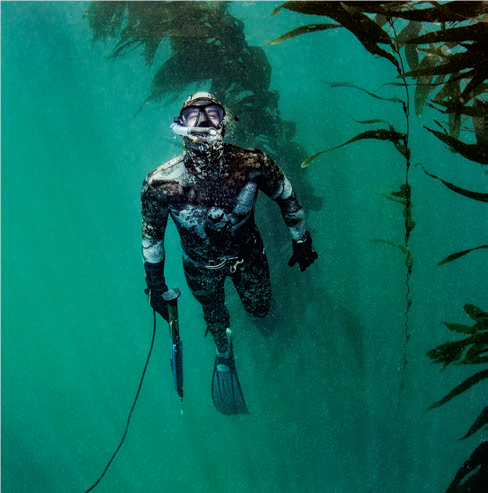Lung squeeze under cold diving conditions

Q: Is there any reason cold water might increase the likelihood of lung squeeze while freediving? I have experienced lung squeeze a few times, but only in cold water (around 45°F). I was shallower than 100 feet. In warm water I can reach 165 feet, so I believe the squeeze is somehow related to the water temperature.
You described your condition as lung squeeze, but it sounds like your question is really about what might have caused you to cough up blood from your lungs (presumably) under the conditions you describe. Given the variable impact of depth on the development of the condition, you could be experiencing a form of immersion pulmonary edema (IPE).
IPE is a multifactorial condition, largely a net effect of increased central blood volume, pressures within the chest and, for compressed-gas divers, increased breathing resistance. The squeeze is a primary component, but only part of the story. Immersion produces a shift in blood from the periphery to the core, and this effect can be magnified in cold water or partially replicated by wearing a tight wetsuit. Excessive fluid intake (hyper-hydration) increases the risk.
For compressed-gas divers, respiratory loading (most important, the effort to inhale) increases with water immersion, with breathing through a mouthpiece that adds resistance (particularly as gas density increases) and with exertion. Using compressed gas or freediving, if the net effect of the various stressors is a sufficient increase in the pulmonary artery pressure, capillary stress failure can produce a shift of blood into the lungs. Symptoms of IPE can include the perception of strain or stiffness in breathing, coughing and the coughing up of small amounts of blood.
While I cannot confirm that this is what you are experiencing, it may be that the central blood volume increase magnified by the cold water is the stressor that takes you over the edge that you skirt in warmer water exposures. IPE is most likely to appear when multiple predisposing factors are acting in concert. You may have found your own threshold. I encourage you to consult with your medical monitors, keeping in mind that the classic squeeze is not the only risk that freedivers face.
— Neal W. Pollock, Ph.D
You described your condition as lung squeeze, but it sounds like your question is really about what might have caused you to cough up blood from your lungs (presumably) under the conditions you describe. Given the variable impact of depth on the development of the condition, you could be experiencing a form of immersion pulmonary edema (IPE).
IPE is a multifactorial condition, largely a net effect of increased central blood volume, pressures within the chest and, for compressed-gas divers, increased breathing resistance. The squeeze is a primary component, but only part of the story. Immersion produces a shift in blood from the periphery to the core, and this effect can be magnified in cold water or partially replicated by wearing a tight wetsuit. Excessive fluid intake (hyper-hydration) increases the risk.
For compressed-gas divers, respiratory loading (most important, the effort to inhale) increases with water immersion, with breathing through a mouthpiece that adds resistance (particularly as gas density increases) and with exertion. Using compressed gas or freediving, if the net effect of the various stressors is a sufficient increase in the pulmonary artery pressure, capillary stress failure can produce a shift of blood into the lungs. Symptoms of IPE can include the perception of strain or stiffness in breathing, coughing and the coughing up of small amounts of blood.
While I cannot confirm that this is what you are experiencing, it may be that the central blood volume increase magnified by the cold water is the stressor that takes you over the edge that you skirt in warmer water exposures. IPE is most likely to appear when multiple predisposing factors are acting in concert. You may have found your own threshold. I encourage you to consult with your medical monitors, keeping in mind that the classic squeeze is not the only risk that freedivers face.
— Neal W. Pollock, Ph.D
Posted in Alert Diver Fall Editions, Dive Safety FAQ
Posted in Freediving, spearfishing, ColdWater, Lung squeeze
Posted in Freediving, spearfishing, ColdWater, Lung squeeze
Categories
2025
2024
February
March
April
May
October
My name is Rosanne… DAN was there for me?My name is Pam… DAN was there for me?My name is Nadia… DAN was there for me?My name is Morgan… DAN was there for me?My name is Mark… DAN was there for me?My name is Julika… DAN was there for me?My name is James Lewis… DAN was there for me?My name is Jack… DAN was there for me?My name is Mrs. Du Toit… DAN was there for me?My name is Sean… DAN was there for me?My name is Clayton… DAN was there for me?My name is Claire… DAN was there for me?My name is Lauren… DAN was there for me?My name is Amos… DAN was there for me?My name is Kelly… DAN was there for me?Get to Know DAN Instructor: Mauro JijeGet to know DAN Instructor: Sinda da GraçaGet to know DAN Instructor: JP BarnardGet to know DAN instructor: Gregory DriesselGet to know DAN instructor Trainer: Christo van JaarsveldGet to Know DAN Instructor: Beto Vambiane
November
Get to know DAN Instructor: Dylan BowlesGet to know DAN instructor: Ryan CapazorioGet to know DAN Instructor: Tyrone LubbeGet to know DAN Instructor: Caitlyn MonahanScience Saves SharksSafety AngelsDiving Anilao with Adam SokolskiUnderstanding Dive Equipment RegulationsDiving With A PFOUnderwater NavigationFinding My PassionDiving Deep with DSLRDebunking Freediving MythsImmersion Pulmonary OedemaSwimmer's EarMEMBER PROFILE: RAY DALIOAdventure Auntie: Yvette OosthuizenClean Our OceansWhat to Look for in a Dive Boat
2023
January
March
Terrific Freedive ModeKaboom!....The Big Oxygen Safety IssueScuba Nudi ClothingThe Benefits of Being BaldDive into Freedive InstructionCape Marine Research and Diver DevelopmentThe Inhaca Ocean Alliance.“LIGHTS, Film, Action!”Demo DiversSpecial Forces DiverWhat Dive Computers Don\'t Know | PART 2Toughing It Out Is Dangerous
April
